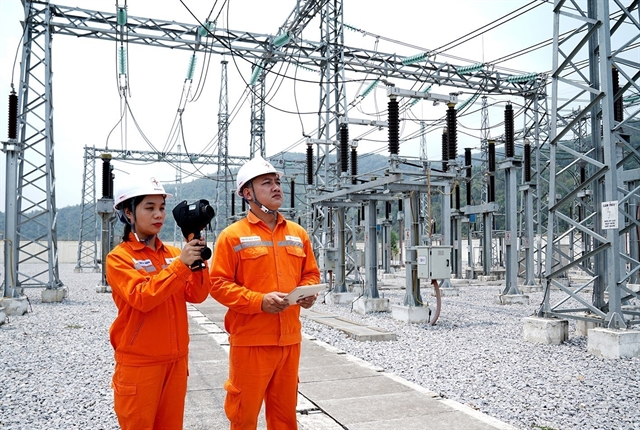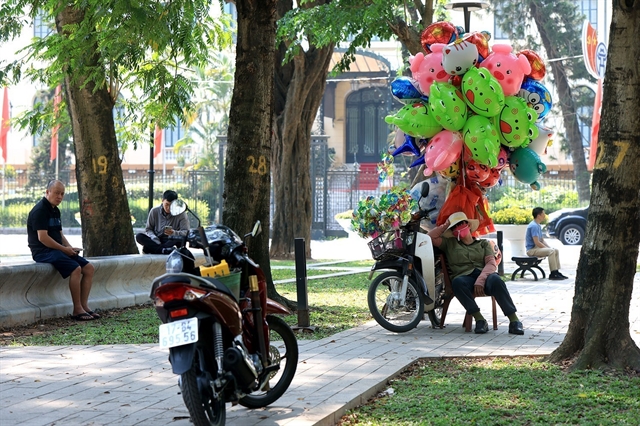 Society
Society

 |
| Street vendors in Hà Nội make use of any shade to take a rest. VNA/VNS Photo |
HÀ NỘI Over the past few weeks, long-lasting extreme heat waves have affected people all across the country, making especially it difficult for those working outdoors.
Motorbike taxi driver Nguyễn Văn Khải, who works in Hà Nội, said he must wear long sleeves and a helmet with a face shield whenever he is outside in order to protect himself from the sun's dangerous rays.
He takes advantage of the moments when there are no passengers to sit and relax beneath the bridge or under the shade of a tree.
"I have to work for the sake of life, even though the weather is hot and harsh," he told Vietnam News Agency.
Lê Ngọc Lâm, a worker at the Tuynel brick factory in Triệu Sơn District, Thanh Hóa Province, said he normally starts work at 7am but when the temperatures are forecast to hit 40 degrees Celsius and the heat is at its worst, he must begin working at 4am in order to complete by 10am.
"I sweat a lot in hot weather because my daily job is to load and unload bricks from the pits. I have to drink a lot of water and wear protective gear," he said.
In HCM City, the heat can be felt from 8am. Many people who go to work in the morning feel tired due to morning heat.
Phạm Văn Tài from Tân Thới Hiệp Ward in District 12 said: "I have already seen the bright sunshine while taking my child to school at 7am.”
Due to traffic, he has to spend about an hour traveling 12km from his home in District 12 to District 3.
"I feel exhausted in the morning from the heat and the traffic," he said.
In many other places, the heat has also brought droughts. The Department of Agriculture and Rural Development in the Central Highlands' Đắk Nông Province reports that the prolonged heatwave caused numerous lakes, rivers and streams to progressively dry up.
Over 8,000ha of crops in the province are vulnerable due to water scarcity.
Numerous small rivers and streams in the area have dried up, reducing the amount of water in irrigation reservoirs and decreasing the flow of nearby rivers and streams.
Some tiny ponds have lost their water source, and the amount of water that people had been storing in small ponds to irrigate crops in streams and high foothills has also dropped.
The southern droughts have gotten worse because of the heat.
A state of emergency has been declared in four provinces - Tiền Giang, Cà Mau, Kiên Giang, and Long An - as a result of droughts. In Cà Mau and Kiên Giang, the drought has resulted in landslides and subsidence.
The National Centre for Hydrometeorological Forecasting predicts that temperatures will generally be between 0.5 and 1 degree Celsius higher than the average for many years during the upcoming months, particularly from July to September.
There will be more intense heatwaves, particularly in the north and central regions.
Hoàng Phúc Lâm, the centre’s deputy director, said extreme heat is probably going to occur more frequently than it has in many past years. The last months of 2024 will see continued heat in the northern and central regions. The heat in the north will persist until August, with July being the key heat-producing month. The heat will persist in the central region through September, with July and August being the peak months.
Medical experts warn that excessive heat will have negative effects on people's health. For those who have to work in hot weather, it is necessary to arrange working time in cool weather such as early morning or late afternoon, and avoid working in high temperatures.
If working in a hot environment, employees should limit their work hours, refrain from engaging in strenuous physical activity, and take a 15–20 minute break in a cool area after 45–60 minutes of work.
They are advised to wear loose, airy, sweat-absorbent clothing, avoid using alcohol completely, and stick to drinking water with added salt and minerals, such Oresol, instead of exposing any part of their body to direct sunlight, especially the neck and shoulder area.
Local authorities have been urged to take prompt measures to help local residents avoid the heat, especially ensuring domestic water supply. VNS